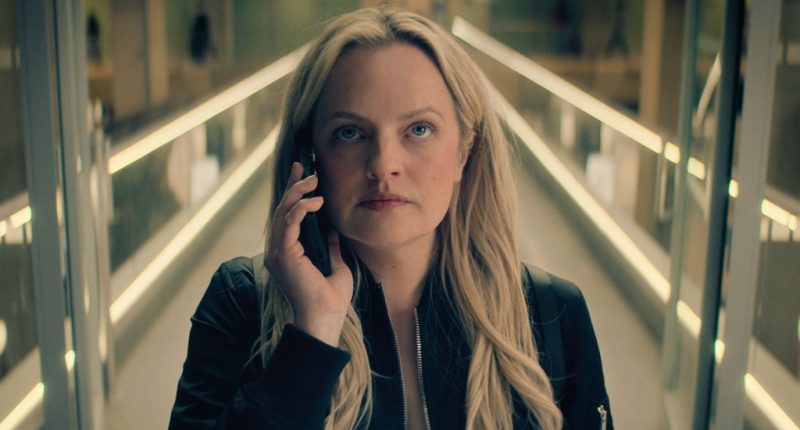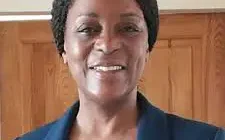We meet Elisabeth Moss‘ Portia in the first scene of FX’s new Hulu drama The Veil, striding confidently through a busy international airport, stiletto heels precariously high, her mouth a gash of crimson lipstick. She’s meeting a shady businessman named Tomas, and they toast to a transaction successfully made. But several seconds later, Interpol rushes in and she chides Tomas for all the criminal details he spilled in the previous 37 days. She walks away, leaving him fuming and in custody.
Her name isn’t actually Portia. As she leaves, aspect and tone instantly changed, she’s already arranging her next destination — Istanbul — and her next identity, telling a person on the telephone, “I would like my name to be Imogen.” She will be Imogen for the rest of The Veil.
The Veil
The Bottom Line
Fizzles after a promising start.
Airdate: Tuesday, April 30 (Hulu)
Cast: Elisabeth Moss, Yumna Marwan, Dali Benssalah, Josh Charles
Creator: Steven Knight
It’s here, two minutes into the show, that eagle-eyed viewers and English majors should already be putting together certain pieces. Portia and Imogen are both Shakespearean heroines — in The Merchant of Venice and Cymbeline, respectively — and both a specific type of recurring Shakespearean heroine: namely, women who must sometimes disguise themselves as men in order to gain agency. When she isn’t adopting the names of Shakespearean heroines, Imogen is often quoting Shakespeare with favorite reference points including Twelfth Night and The Tempest, both stories in which — you guessed it — role-playing is central.
The Veil creator Steven Knight doesn’t literalize those connections by making Imogen pretend, at any point, to be a man, but she’s just one of several key figures who spend more time pretending to be other people than being themselves. The metaphorical objectives are interesting and obvious.
The six-episode series — close-ended, but not so close-ended that FX couldn’t order more in the event of success — is about steps women must take to retain autonomy in primarily male spaces. It’s a spy thriller in which gender is a weapon and a superpower, one that builds a reasonable amount of intrigue through its first half.
Unfortunately, for all of its potent ideas, its carefully chosen and depicted European locations and Moss’ excellence — which should never be taken so entirely for granted that you don’t pause and marvel — Knight doesn’t know how to steer his story to a place that’s as provocative as its origins. The Veil first becomes perfunctory — Homeland-lite — before fizzling entirely in its concluding episodes, in which almost none of its twisty reveals hits deeply on either a plot or character level.
The series’ main story finds the newly minted Imogen heading to a refugee camp on the Syrian/Turkish border. A woman in one of the camps has been identified as a high-level ISIS operative, perhaps the most powerful of her gender. The woman, however, claims to be Adilah El Idrissi (Yumna Marwan), a native of Paris who was briefly an ISIS flunky, but really just wants to return to her daughter.
It’s up to Imogen, a woman with no real name and no real fixed identity, to abduct Adilah and find out if she’s who she says she is or if she’s who various international law enforcement agencies insist she is. See, Imogen, whatever her real name is, is an MI6 agent with a unique gift for getting people to open up to her, not through torture, but through careful social manipulation.
Quickly, Imogen and Adilah are on the run across Europe, from Istanbul to Paris and beyond, each woman feeling the other woman out and trying to see past her surface identity. Imogen is liaising with Malik Amar (Dali Benssalah), a Muslim agent in French intelligence. Imogen and Malik happen to be lovers, and Malik also happens to be on the verge of losing the case, because the CIA has sent Max Peterson (Josh Charles) — described by Malik’s boss (Thibault de Montalembert) as “The most American American America has ever produced” — to usurp the operation.
Will Imogen be able to get answers? Will she be able to prevent the terrorist attack? And will she be able to do it all while holding back intruding details from her actual past, including flashes of a mysterious man (played by James Purefoy, so you know he’ll eventually be more than just snippets in flashbacks)?
There are so many things that The Veil, written entirely by Knight and directed by Daina Reid and Damon Thomas, does well in the beginning. Knight layers enough specific and intriguing details about international intelligence-gathering and jurisdiction that you can believe there might be enough bickering and penis-measuring between the men who think they’re in charge to allow for Imogen’s decidedly unorthodox methods to go unchecked. There are a couple of brief, but brutal, set pieces that push the plot forward and let Moss convincingly play action hero in a way that she hasn’t exactly done before (not that she hasn’t frequently been an assertive physical presence in The Handmaid’s Tale, Top of the Lake and The Invisible Man).
Still, what Moss has always been best at is playing mind games with other characters onscreen, and with the viewers. Long stretches of the early episodes of The Veil are just Imogen and Adilah talking in cars and quiet spaces, not wanting to reveal themselves fully. Moss and the excellent Marwan both capture this delicate dance in their performances; you’re never sure how much of what they tell each other is true, how much each woman believes, and whether or not the audience is supposed to be catching on faster than the characters.
The whole time, the series is taking audiences through some of the most beautiful cities in the world and showcasing what must have been an impressive travel budget. Just as both Imogen and Adilah have both the side of themselves that they show to the world and whatever their truth might be, cities like Istanbul and Paris exist in layers or behind veils, offering the sides you know from postcards and the sides that might only be recognized by natives. The Veil leans a little too much into the postcard versions of the cities, especially Paris, where the Eiffel Tower is just lurking in the background of every wide shot — like Peter Lorre’s character in M minus the ominous whistling. Still, the series looks great throughout, even if it would be valid to feel like, when it comes to off-the-beaten-path treatment of Paris, The Veil is less inventive than, of all things, The Walking Dead: Daryl Dixon.
Had The Veil been content to be Imogen and Adilah playing cat-and-mouse for six episodes, I probably would have loved the series. But it becomes more and more conventional as it progresses and gives more and more dramatic weight to the one-dimensional men played by Benssalah and Charles. On some level, these men are supposed to be one-dimensional, and it’s easy to enjoy the scenery-chewing pleasure that Charles is taking in playing the most American American who ever Americaned, but one-dimensional is still one-dimensional. Malik in particular is so underwritten as to become both forgettable and intrusive, as are the specific elements of the terrorist plot.
I forgot to previously mention “efficiency” among the show’s best traits. With episodes running between 35 and 46 minutes, The Veil is thoroughly and admirably spare, right up until a finale that, at 65 minutes, feels like almost a completely different series. The finale shifts the focus away from the characters and dynamics that were previously satisfying and builds strange contrivances involving previously tertiary or entirely unmentioned characters. I kept waiting for payoffs to some of the rich themes baked into Imogen’s character from the beginning. Instead, the revelations and answers mostly disappoint.
Dating back to The West Wing and Mad Men, Moss is a Mount Rushmore-level performer in what has been one of the most creatively fertile eras in television history, and The Veil is full of things she hasn’t gotten to play in the past — starting with a plummy British accent that I would describe as “absolutely consistent enough.” She does everything Knight and the directors demand of her and more, but instead of becoming another Peak TV classic for Moss, The Veil ends up being closer to Apple TV+’s Shining Girls — a fruitful acting showcase, a scattering of good elements and a concluding fizzle that lets down viewers, if not its star.
Also Read More: World News | Entertainment News | Celebrity News









